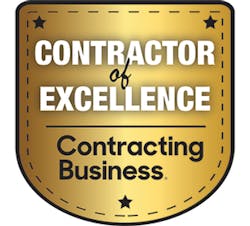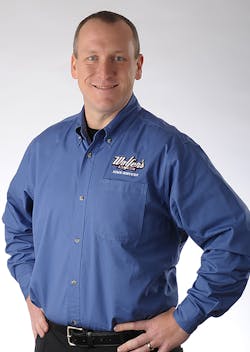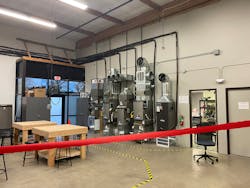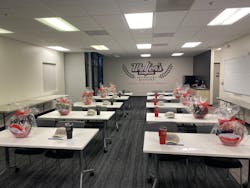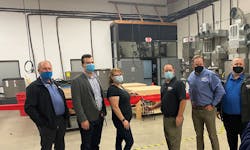as E.S. Wolfer Heating & Sheet Metal, in Anita, Iowa. He moved the business to Oregon in 1915, to specialize in sheet metal fabrication and gas plumbing, and later, heating and air conditioning. Wolfer’s is the second-oldest Lennox dealership in the US.
John and Karen Christin purchased the company in 2009, and recently sold the business to The Flint Group.
For this profile we spoke to Tim Daley, now in his 11th year as general manager. He was originally helping Wolfer’s plan its marketing strategies when John Christin eventually recruited him for a sales position.
Daley instituted a “consultative-based” selling process.
“Consultative selling is very customer focused. It focuses on taking real time with every single customer, to understand their priorities, and to ensure that whatever we’re recommending, that the people we send to their homes are experts in what they do, so they can match up a service or a product with the priorities of the homeowner,” Daley explained. “When you do that, you don’t have to sell anything. People understand what their choices are, and they buy what they want to buy. At that point, it’s easy to make customers happy, because all you have to do is install it correctly.”
Daley said he can’t fathom selling any other way, and that some competitors will spend very little time with their customers.
“Would you buy a car over the phone?” he asked. “Most people wouldn’t buy a car over a phone even if they had a thousand pictures of the car. You need to sit in it, drive it. Well, quite frankly, heating and cooling systems are the samething. You’re going for comfort and functionality, and I think homeowners often take for granted just how much comfort equipment is available for them, and it just takes a little bit of time to educate them and help them understand the choices."
Wolfer’s growth-focused business plan adheres to a service technician-based model.
Daley said everything about customer visits changed during the pandemic. 'Your customer changed, the circumstances you work in changed. We had to figure out how to accommodate people. We did virtual sales calls for those folks that needed it . . . '
“With a service technician-based model, you first do a really good job of putting technicians in people's homes. Then, when you have enough technicians in enough homes, you will get service revenue and installation and replacement revenue. We also are a partner with retail big box for direct installation leads. We work both of those channels to boost install, retrofit, and replacement HVAC revenue. We monitor revenue, and pay a lot of attention to gross profits. There's a certain percentage that you're typically looking for on your service and installation sides. We're not looking to get huge numbers. As a matter of fact, our margins are maybe slightly smaller than industry average. We try to make up for that in volume.”
The team works closely on determining HVAC system repair value v. replacement value, and factor in billable hour efficiency.
“We’re looking for people that sell the gamut [of services] because your customers run the gamut. Some will buy really high, and some will buy really low, and some in between. Average dollars per lead helps to average all of it out, and help us figure out where the salespeople are landing.”
Daley wanted to be clear that Wolfer's success has been very much a result of employee efforts.
Wolfer’s specific KPI detailing will help it reach about $22 million in revenue for 2021 from combined offices in Woodburn and Vancouver, WA.
Daley wanted to be clear that Wolfer's success has been very much a result of employee efforts.
Daley said everything about customer visits changed during the pandemic.
“Your customer changed, the circumstances you work in changed. We had to figure out how to accommodate people. We did virtual sales calls for those folks that needed it. We also worked on our messaging to make sure that, especially as the vaccines came out, we could offer vaccinated technicians and salespeople to our customers.”
Supply deliveries were hampered by fewer vendors allowing their trucks to roll due to poor visibility and bad air quality during the Oregon wildfires of 2021. Some Wolfer's customers lost their homes to the fires.
"And so, we couldn't get our hands on product. Then, we also had to be sensitive to our own employees. Some of them were like, 'Hey, look, I'll work through this."And then, last year, we also moved. So, we were going through the process to build out a new facility that was about four times larger than our old facility, and it's already too small, so we're already looking at expanding. It's been a pretty bizarre, challenging, and yet awesome 18 months."










